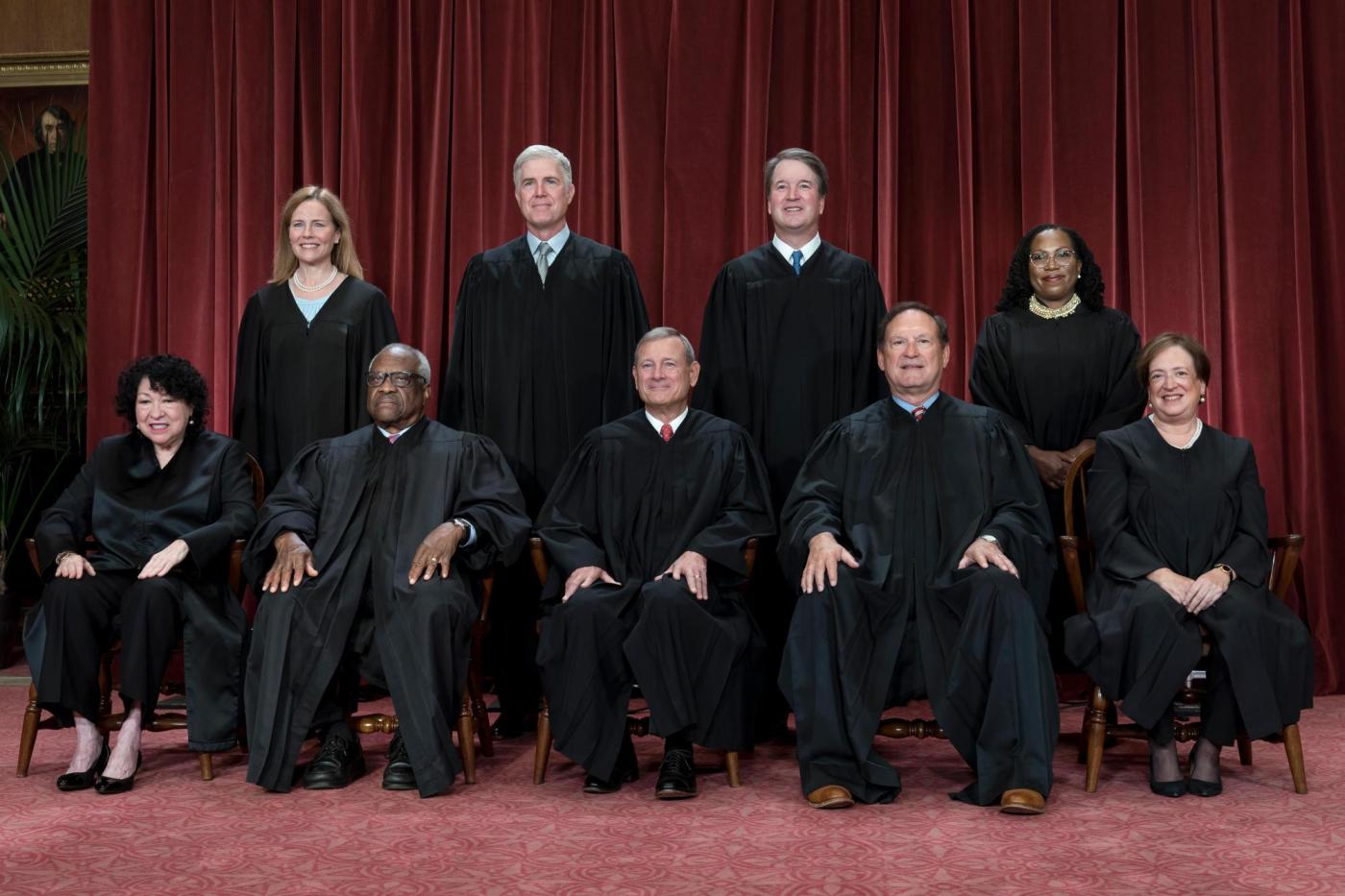
Jesse Wegman: There’s no sense of shame at the Supreme Court
An earlier generation of Supreme Court justices seemed to possess the capacity for shame.
In 1969, Justice Abe Fortas resigned his seat for accepting a $20,000 consulting fee (which he returned) from a foundation led by a man who was convicted of securities fraud.
Whatever Fortas believed about his honor and morality, he understood that the Supreme Court is an inherently fragile institution and that its nine justices cannot afford the slightest whiff of bias or corruption. As The New York Times editorial board wrote then, “A judge not only has to be innocent of any wrongdoing but he also has to be above reproach.” Placing the court’s and the country’s interests above his own, Fortas stepped down.
That sort of humility is nowhere in evidence on today’s court, which is finding new ways to embarrass itself, thanks largely to the brazen behavior of two of its most senior members, Justices Samuel Alito and Clarence Thomas, who are making a mockery of their obligation to at least appear neutral and independent. They fail to report large gifts, luxury vacations and payments to their family members by wealthy donors, at least one of whom had business before the court, and they express nakedly partisan opinions or fail to adequately distance themselves when their spouses express such views.
They are saying, in effect, that they don’t care if any of this bothers you. To go by recent polls showing that this court’s public approval has approached record lows, it bothers many millions of Americans. And yet no one in Washington seems willing to act.
It can’t go on. The court’s refusal to police itself — willingly allowing a few justices to trample on its reputation — demands that Congress step up and take far stronger action to enforce judicial ethics and to require justices to recuse themselves when they have or appear to have clear conflicts of interest.
The latest in a long list of examples became public last week, when the Times reported that an upside-down American flag flew over the front lawn of the Alito family home in the immediate aftermath of the Jan. 6 insurrection incited by then-President Donald Trump. The flag, a clear pro-Trump statement widely flown by those who believed the 2020 election was stolen, apparently stayed up for days, even as the court was weighing whether to hear a case challenging the outcome of the election. (The court voted not to hear the case. Alito, like Trump, was on the losing side.)
In a statement to the Times, Alito placed the blame for the hoisting of the flag on his wife, Martha-Ann Alito, in response to a dispute with some neighbors. He said nothing about any attempt to remove it nor did he apologize for the glaring ethical violation. To the contrary, he has failed to recuse himself from any of the several Jan. 6-related cases currently before the court, including Trump’s claim that he is absolutely immune from prosecution for his role in the Capitol assault.
Thomas may be even more compromised when it comes to Jan. 6. His wife, Ginni Thomas, participated in the legal effort to subvert the election and keep Trump in power. And yet with one minor exception, he has also refused to recuse himself from any of the Jan. 6 cases.
Other justices revealed political biases in the recent past. In 2016 the Times editorial board criticized Justice Ruth Bader Ginsburg for referring to Trump as a “faker,” comments for which she quickly expressed regret. That was the right response, but it couldn’t unring the bell.
As all justices are aware, federal recusal law is clear: “Any justice, judge or magistrate judge of the United States shall disqualify himself in any proceeding in which his impartiality might reasonably be questioned.”
In the Jan. 6 cases, recusal should not be a close call. At the least, reasonable people are justified in questioning Alito’s impartiality based on his failure to take down the inverted flag, especially during a period of intense national conflict over an issue that was at that very moment before the justices.
Thomas’ extreme closeness with his wife (he has described them as being melded “into one being”) raises similar doubts about his ability to be impartial. He is further implicated by a separate provision of the law, which requires a judge to recuse when his or her spouse is “to the judge’s knowledge likely to be a material witness in the proceeding.” That sure sounds like Ginni Thomas, who testified, under threat of a subpoena, before the House Jan. 6 committee.
In short, Alito and Thomas appear to be breaking federal law, tanking what remains of the court’s legitimacy in the process. The challenge is whether anyone is willing to do anything about it.
“If there’s no recusal in this situation, if a justice is flying a banner to support a violent insurrection while he is sitting on a case that implicates the scheme to steal the election, is the recusal statute a dead letter?” Alex Aronson, executive director of Court Accountability, a judicial reform organization, asked me.
It’s a fair question. The Ethics in Government Act requires the Judicial Conference, which is chaired by Chief Justice John Roberts, to refer to the Justice Department any case in which there is reason to believe a judge willfully broke the law. The attorney general does not have to wait for a referral, but based on how Attorney General Merrick Garland’s Justice Department handled the Trump investigations, I’m not holding my breath.
The Supreme Court’s recently adopted ethics code isn’t much help, either. If anything, it makes matters worse, undercutting the authority of existing law and giving the justices even more space to act with impunity.
Mark L. Wolf, a senior federal district judge in Massachusetts who worked in President Gerald Ford’s Justice Department, said in a lecture this year that in adopting the code, “the Supreme Court has essentially asserted the power, if not the right, to disobey laws enacted by Congress and the president. Thus, the code undermines the system of checks and balances that safeguard our constitutional democracy, threatens the impartiality of the Supreme Court and jeopardizes crucial public confidence in the federal judiciary.”
Roberts may not have the power to force any of his colleagues to do the right thing, but he does have moral and institutional authority. And yet it appears the new code of ethics is no match for the old code of omertà that has bound justices for generations. As the Times reported, the Alito flag incident soon became known to the court (where, by the way, regular staff members are barred from any political activity, down to displaying bumper stickers), and yet it was suppressed for more than three years.
We are faced with flatly unacceptable behavior from the most powerful judges in the land. If nothing else, Congress has the power to call that to light, to name and shame the wrongdoers. This would be a truth-seeking mission as well as a public service, showing the American people just how corrupt some justices are.
So what is Congress afraid of? Committees can and should hold hearings and subpoena witnesses to answer questions before the nation. They can subpoena Alito himself. If he declines to show, subpoena his wife. He implicated her, after all, and she certainly has no separation-of-powers claim. Then subpoena Roberts, who declined to testify last year when he was asked politely. If he still doesn’t show up, Congress should remember it has the power of the purse and can reduce the court’s nonsecurity budget.
As right-wing activists have understood about an institution with lifetime tenure, it’s all part of the long game. Alito and Thomas may be in their mid-70s, but a new generation of even more extreme, more partisan activists is coming up through the judicial ranks. Many of them were appointed to the federal bench in Trump’s first term, and many more would surely be in a second term. These men and women will take the absence of meaningful congressional action as carte blanche to run roughshod over ethical norms.
This is about the future as much as the past. Young Americans who are voting for the first time this year were born after Bush v. Gore; some were not even in high school when Sen. Mitch McConnell stole a Supreme Court seat from President Barack Obama. For all they know, this is how the court has always been and always will be.
That’s why now is the time to show future generations that the nation needs a court that can be trusted to be fair, a court whose justices have the capacity for shame. The Supreme Court is an institution that we depend on as much as it depends on us.
Jesse Wegman writes for the New York Times.
Related Articles
Thomas Friedman: Bibi is choosing Stefanik and Trump. Don’t be fooled, President Biden
Robin Abcarian: Israel’s Gaza war is horrific, but that doesn’t mean Hamas is innocent of sexual violence
Mark Gongloff: U.S. wildfire season is now everywhere, all at once
Daniel Bral: No, the Israeli-Palestinian divide is not unbridgeable. Here’s how I know
Jennifer Huddleston: AI and privacy rules meant for Big Tech could hurt small businesses most


